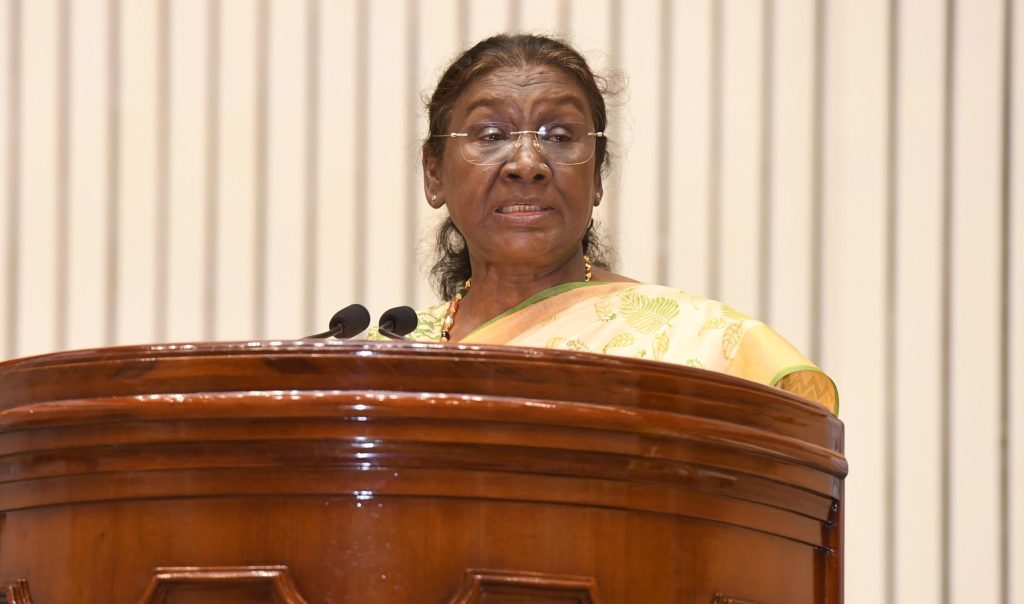In a firm rebuttal to the Supreme Court’s April 8 verdict, which imposed deadlines on the Governor and the President for deciding on state Bills in the Tamil Nadu government versus Governor case, President Droupadi Murmu has questioned the validity of such a ruling, emphasizing that the Constitution does not prescribe any such time frames.
The President’s response highlights that Article 200 of the Constitution of India delineates the powers of the Governor and the procedures for granting or withholding assent to Bills, as well as reserving a Bill for the President’s consideration. However, Article 200 does not specify any timeline for the Governor to exercise these constitutional options.
Similarly, Article 201 outlines the President’s authority and process for assenting to or withholding assent from Bills, but it does not impose any deadlines or procedures for the exercise of these constitutional powers.
Furthermore, the Constitution of India recognises numerous instances where the President’s assent is required before legislation can take effect in a state. The discretionary powers of the Governor and the President, as provided under Articles 200 and 201, are shaped by multiple considerations, including federalism, legal uniformity, national integrity and security, and the doctrine of separation of powers.
Adding to the complexity, the Supreme Court has delivered conflicting judgments on whether the President’s assent under Article 201 is subject to judicial review. States frequently approach the Supreme Court under Article 32–rather than Article 131–raising federal questions that inherently require constitutional interpretation, states the president’s response.
The scope of Article 142, particularly in matters governed by constitutional or statutory provisions, also calls for a Supreme Court opinion. The concept of “deemed assent” for the Governor or President contradicts the constitutional framework, fundamentally restricting their discretionary authority.
Given these unresolved legal concerns and prevailing circumstances, President Murmu has invoked Article 143(1) of the Constitution, referring critical questions to the Supreme Court for its opinion. These include:
1. What are the constitutional options available to a Governor when presented with a Bill under Article 200?
2. Is the Governor bound by the advice of the Council of Ministers in exercising these options?
3. Is the Governor’s exercise of discretion under Article 200 subject to judicial review?
4. Does Article 361 impose an absolute bar on judicial scrutiny of a Governor’s actions under Article 200?
5. Can courts impose deadlines and prescribe procedures for Governors to follow when exercising their powers under Article 200, despite the absence of constitutional timelines?
6. Is the President’s discretion under Article 201 subject to judicial review?
7. Can courts set timelines and procedural requirements for the President’s exercise of discretion under Article 201?
8. Must the President seek a Supreme Court opinion under Article 143 when deciding on Bills reserved by the Governor?
9. Are decisions made by the Governor and President under Articles 200 and 201 justiciable before a law officially comes into force?
10. Can the judiciary modify or override constitutional powers exercised by the President or Governor through Article 142?
11. Does a state law come into effect without the Governor’s assent under Article 200?
12. Must any bench of the Supreme Court first determine whether a case involves substantial constitutional interpretation and refer it to a five-judge bench under Article 145(3)?
13. Do Supreme Court powers under Article 142 extend beyond procedural matters to issuing directives that contradict existing constitutional or statutory provisions?
14. Does the Constitution allow the Supreme Court to resolve disputes between the Union and state governments through any means other than a suit under Article 131?
By raising these questions, the President seeks clarity on the constitutional boundaries of executive and judicial authority, reinforcing the need for judicial interpretation in matters of national significance. (Agencies)







